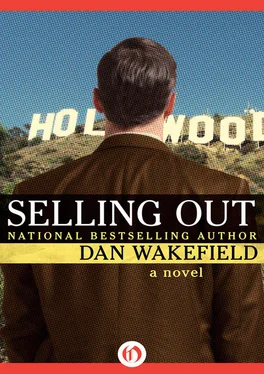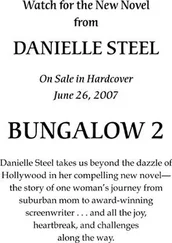“What the hell,” said R. V. Hensel, “let’s have some fun with this thing.”
R.V. (now known to all of them affectionately as Arvy) was an owlish fellow in his middle fifties whose potbelly bulged through the buttons of old-fashioned Hawaiian-style sports shirts of the kind once worn by Harry S Truman. When Archer Mellis wangled one additional script commitment out of the network even before the pilot went on, it meant they could hire an additional writer (Perry himself was of course doing the opening show), and Perry, Ned, and Kenton had all wanted to take a chance on Buddy Byler, a brilliant UCLA Film School dropout who had broken into TV with an after-school special on teenage break dancers. To Perry’s shocked surprise, Archer had vetoed that vote for youth, saying they should keep Byler in the wings if the show took off, and insisted on going with quality, as proven by the aging Hensel’s having won an Obie back East twenty years before! The poor guy must rub it every night for luck.
“Bowling might really work,” Perry mused, about to expound on how a hip young couple might see this lower-class pastime as kind of campy fun and then really get into it, joining a local league, but his creative stream of thought was interrupted by a sudden knock at his door and the sweating head of Kenton popping in to say, “Archer wants us— now .”
Perry leaped up.
“May Allah be with you,” Hal Hagedorn said.
The others, with sincere concern, chimed in their prayers of support.
Their own fete, after all, was now tied in with the fate of the show and its creator.
“What could be wrong?” Perry asked, hurrying to keep in stride with Ned and Kenton as they grimly made their way to Archer’s office.
Whenever they were summoned like this it meant trouble. It must have been especially serious for Kenton to be called off the set, while directing the first of the hour episodes. It was not the first one that would be aired—that was Perry’s, but he had been so busy he hadn’t even finished his own script before the first draft of Hal Hagedorn’s episode about Laurie taking karate lessons came in. It was so beautifully polished and expertly done that it was practically ready to shoot, so Ned and Kenton decided to go with it right away instead of waiting for Perry. The creator suffered a twinge of envy that this newcomer to the show had taken to it so perfectly, but it meant they had found a real successor to assume the writing leadership when Perry returned to Vermont. That, too, stirred mixed feelings in Perry: a grudging sort of gratitude.
“It must be the barbarians at the network,” Ned growled. “They probably find Kenton’s dailies too subtle. Not crass enough.”
“At least if they make us reshoot anything we’re not under the gun with time pressure,” the perspiring young director said. “Thank God we don’t go on the air till the fall.”
“That’s right,” Ned said. “Once we’re on the air week to week there’s no stopping the express train without a crash.”
“Why don’t we not think about it,” Perry said, with rising anxiety, “till we hear what it is.”
When they walked into Archer Mellis’s office they found the young executive standing on his head. He was wearing a Los Angeles Lakers warm-up suit.
“You’re going on the air in three weeks,” he announced from his inverted position.
“That’s crazy!” Ned Gurney shouted. “That’s the first week in August.”
“They don’t start new shows till the fall, do they?” Perry inquired.
“They can’t start this one,” Kenton said. “We won’t be finished shooting.”
“They’re just putting on the pilot,” Archer said, remaining unperturbed and upside down.
“In the name of all reason, why?” demanded Ned.
“It tested well at Preview House.”
Preview House was a theater on Hollywood Boulevard where random audiences of people with nothing better to do were rounded up and subjected to screenings of TV pilots and other assorted film material not yet seen or heard of by the public. The reaction was thus supposed to be pure. Viewers registered their like or dislike or indifference to particular scenes and actors by pressing buttons located at their seats, and by filling out a detailed questionnaire upon leaving the theater.
“Is that any reason to put it on the air before the season even begins?” Ned inquired, getting down on the floor and trying to look Archer in the eyes.
Archer let his legs fall behind him and sprang up to a standing position.
“Since it’s not typical prime-time material they want to give it a chance to score well against soft opposition. They’re putting it on against a National League game between two cellar dwellers, and an amateur magic show contest among senior citizens at Sun City, Arizona.”
“Baseball and magic sound like pretty potent stuff to me, no matter how bad it is,” Kenton moaned, “especially against an unknown pilot of a never-seen series.”
Archer went to his closet, flung it open, and grabbed a metal bar that was installed above his head in the door frame. He began doing chin-ups.
“Think victory,” he said. “If you beat the opposition you’ll have proven yourself in combat. Your fans at the network will strengthen their hand.”
“ Television! ” Ned Gurney roared, throwing up his hands in frustration.
“That’s the business we’re in,” said Archer, chinning himself with precise rhythm. “Remember?”
It was D day.
The three weeks seemed to have passed in three seconds. It was the several hours before the show that seemed to drag like eons.
Perry and Jane, along with Kenton and his wife, had been invited to Ned’s to have one of Kim’s curry dinners and watch the show together. The triumvirate and their women. The ones who had made it happen.
If this were a Broadway production, they would know they had a hit on their hands. The major reviews were already in, since the network arranges advance screenings for TV critics whose judgments must appear the day of the show’s airing to be of any use to the audience. Perry had run in excitedly that morning to show Ned the New York Times , whose critic had called “The First Year” an “unexpected pleasure … uncommonly intelligent.” Ned pointed out that “uncommonly intelligent” might be a turn-off to the mass audience, and was happier with the Associated Press review that called the show “a real heartwarmer,” and Variety ’s label of it as “this season’s socko sleeper,” but, as he ruefully explained, you could take all those reviews and with a buck fifty buy yourself an enchilada.
What counted was not the critics but the public, not the words of praise but the numbers of sets in use and percentage of viewers as tabulated by the Nielsens. That’s why Ned wanted his colleagues to view it on an ordinary TV set on a regular-sized screen right in his own living room, just the way all those other millions of Americans would tonight, for they were the ones whose reaction would determine the fate of the show.
When the first notes of the upbeat theme music sounded, Perry felt as if he might go through the roof. When his credit appeared in a scroll of gold letters on the screen— Written by Perry Moss —he felt what he could only describe as a rush, a sensation surely as powerful as the high produced by any drug in the world.
Though he’d seen the show dozens of times, watching it now as it was aired was an entirely different experience, for he knew at this very moment the picture on the screen before him was being seen on other such sets by millions of people all over the country.
Millions .
In New York and Dallas, Peoria and Pittsburgh, in mansions and hovels from Maine to Seattle, his scenes, his words, were being witnessed by people of all ages and sizes and sexes, people of all political and religious persuasions, people who had doctoral degrees and people who had never read a book in their lives, people who could not even read at all, but were now, all of them, separately but together, unified by the simultaneous showing of the image that Perry himself was watching. This massive national viewing audience was now being gathered and held, entranced, entertained, by his story. And his story was true to his own best perception, his own understanding of life; it was not just drivel or junk, but a tale of which the teller was proud.
Читать дальше












